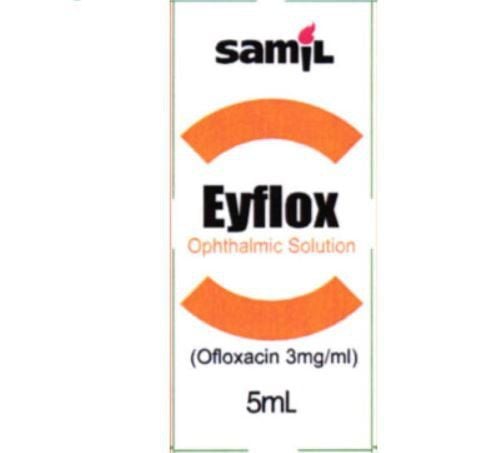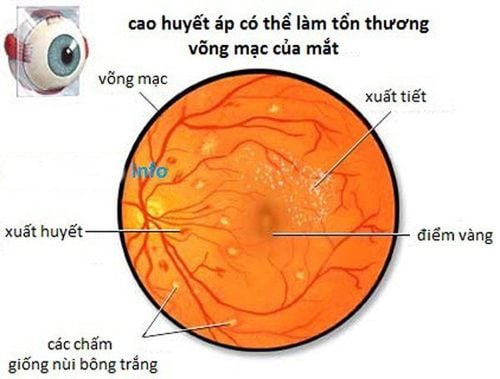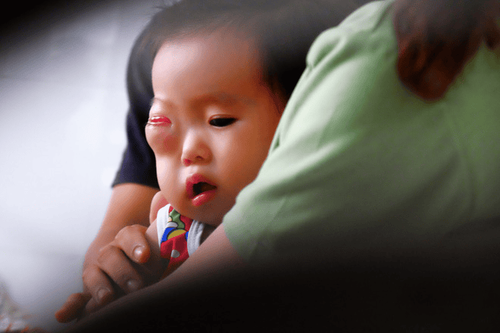This is an automatically translated article.
How to recognize babies with crossed eyes? One eye of your baby will look straight at you, while the other eye will be absentminded. Even sometimes, both eyes seem out of place. However, strabismus in infants is not a cause for concern, as this is the period when your child's eye sphincter muscles are developing and strengthening and he is learning to focus.
1. What is the squint in babies?
Strabismus, or misalignment, is common in infants and young children and can also occur in older children. Your baby may have two crossed eyes or only one eye. In addition, infants with crossed eyes can be continuous or intermittent. Again, it's normal for your child's underdeveloped eye and brain muscles to learn to work in sync and coordinate movements. And babies with crossed eyes usually improve by the time they are 4–6 months old.
However, if an older baby has crossed eyes, there could be something else going on, such as an eye condition known as permanent strabismus - when the eye muscles don't work correctly. At this point, parents need to take the child to an ophthalmologist for correction.
2. How to recognize babies with crossed eyes
How to recognize an infant with strabismus is that the baby's eyes do not look through in the same direction, each eye can look in different directions, from inward, outward, upward and downward.
Inward: Eyes are characterized by having one or both eyes turn inward towards the nose. This is the most common type of strabismus and affects between 2 and 4% of children.
Outward-facing: This pattern involves one or both eyes turning outward toward the ears. This is also sometimes called amblyopia and it affects 1 to 1.5 percent of children.
Upward: This is a condition where the eyes are misaligned, with one abnormally positioned higher than the other. It affects about 1 in 400 children.
Downward: In contrast to upward strabismus, the abnormal eye is located lower than the other eye.
In addition, parents can also detect babies with crossed eyes by other signs such as:
Frequent squinting or blinking, especially in bright light. It could be a signal that your baby is having double vision. Turn or tilt your head. It could be a sign that your baby is trying to line up an object in his field of vision.
3. What are the causes of crossed eyes in babies?
Newborns have crossed eyes because the eye muscles don't work together - but why these muscles don't work together is a mystery to experts. They do, however, know that some children are at higher risk of having crossed eyes than others, including:
Children with a family history of strabismus, especially those with a parent or sibling with strabismus. Children are farsighted. Children who have had an eye injury - for example, due to congenital cataract surgery Children with neurological or brain development problems. Nerves in the eye send signals to the brain to coordinate movement, so babies born prematurely or with conditions like Down syndrome, cerebral palsy, and brain injury are more likely to have crossed eyes.
4. When do babies with crossed eyes need to see a pediatrician?
Although babies with strabismus can be common, it's a problem parents should be aware of, especially if your baby's eyes are still crossed when he's about 4 months old. At this point, it's time for parents to take their children for a checkup.
Infant's crossed eyes can be not only a cosmetic problem but your baby's vision may be endangered. For example, over time, a straighter, more dominant eye can compensate for a crossed eye, which can lead to decreased vision in the diseased eye when the brain inadvertently ignores its visual cues. This is called amblyopia.
Most cases of strabismus in babies are diagnosed between the ages of 1 and 4 - and the sooner the better. There are many treatments for strabismus, from patches to glasses to surgery, that can straighten your child's strabismus and preserve their vision.
5. What are the treatments for crossed eyes in babies?
Vision screening to check for eye health, vision development and eye correction should be part of every baby's well-child visit starting at 6 months of age. If the doctor determines that your child's eye is indeed crossed, he or she will receive one of several treatments depending on the severity of the crossed eye.
Treatments for infants with mild strabismus include:
Spectacles to correct vision in the weaker eye or actively reduce vision in the better eye. As a result, the weaker eye is forced to have more compensatory vision. The eye patch for the normal eye forces the baby to use the weaker eye to see. The purpose of this maneuver is to strengthen the weaker lateral eye sphincter and correct vision. Eye drops. These act like an eye patch, blurring the vision in your child's good eye, so they have to use the weaker eye patch to see. This is a good option if your child is not wearing an eye patch. For more severe cases of newborn strabismus, treatment options include:
Surgery
While your baby is under general anesthesia, the eye muscles will be tightened or relaxed by the doctor. out to adjust the eyes. Your baby may need to wear an eye patch and/or eye drops, but in general, recovery from strabismus should only take a few days.
Babies whose eyes are almost always crossed are more likely to have surgery than those who have it only occasionally. In some cases, the doctor will use adjustable sutures, which allow them to correct the direction of the eye after surgery.
Botox injection
During anesthesia, the doctor will inject Botox into the eye muscle to weaken it, so that the eyeball can adjust the direction of rotation properly.
In summary, recognizing infants with crossed eyes for early detection and treatment is key. However, don't stress too much because it's common for babies to have crossed eyes during the first few months of life. In addition to persistent vision problems, infants with untreated crossed eyes may be slow to reach developmental milestones. If children are diagnosed and treated early, they have the best chance for healthy vision and growth. So if your child is older than 4 months and you still notice some suspicious glances, get them checked out. There are effective treatments for babies with strabismus such as glasses and patches, which are simple and non-invasive, so that children can develop normally.
Pediatrics Department at Vinmec is one of the few multi-specialty hospitals with a full range of doctors specializing in neurology, cardiology, gastroenterology, nutrition, psychology, endocrinology, hepatobiliary, helping to treat quickly and promptly. when diseases are discovered during the examination. As a key area of Vinmec Health System, Pediatrics Department always brings satisfaction to customers and is highly appreciated by industry experts with:
Gathering a team of leading pediatricians: including leading experts, with high professional qualifications (professors, associate professors, doctorates, masters), experienced, worked at major hospitals such as Bach Mai, 108.. Doctors All of them are well-trained, professional, have a mind - range, and are knowledgeable about young psychology. In addition to domestic pediatric specialists, the Department of Pediatrics also has the participation of foreign experts (Japan, Singapore, Australia, USA) who are always pioneers in applying the latest and most effective treatment regimens. . Comprehensive services: In the field of Pediatrics, Vinmec provides a series of continuous medical examination and treatment services from Newborn to Pediatric and Vaccine, ... according to international standards to help parents take care of their baby's health from birth to childhood. from birth to adulthood Specialized techniques: Vinmec has successfully deployed many specialized techniques to make the treatment of difficult diseases in pediatrics more effective: neurosurgery - skull surgery, stem cell transplantation. blood in cancer treatment. Professional care: In addition to understanding children's psychology, Vinmec also pays special attention to the children's play space, helping them to have fun and get used to the hospital's environment, cooperate in treatment, improve the efficiency of medical treatment.
Please dial HOTLINE for more information or register for an appointment HERE. Download MyVinmec app to make appointments faster and to manage your bookings easily.













